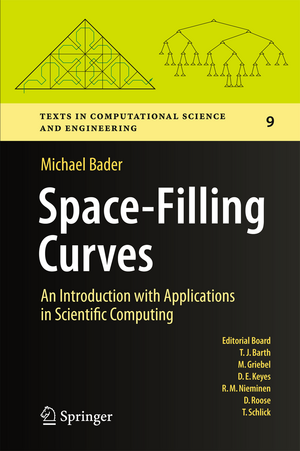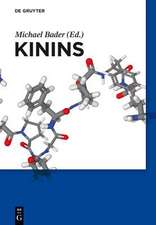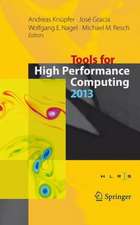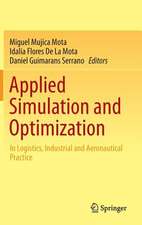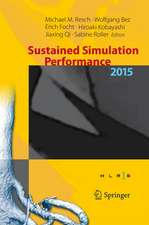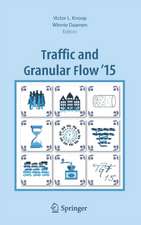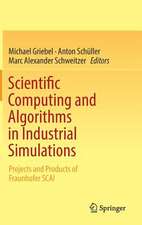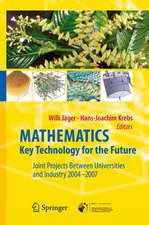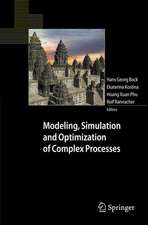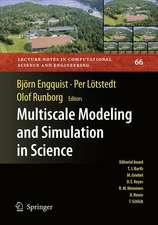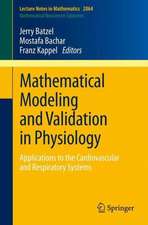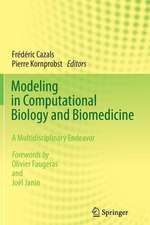Space-Filling Curves: An Introduction with Applications in Scientific Computing: Texts in Computational Science and Engineering, cartea 9
Autor Michael Baderen Limba Engleză Hardback – 14 oct 2012
The locality properties of SFC are discussed in detail, together with their importance for algorithms. Templates for parallelisation and cache-efficient algorithms are presented to reflect the most important applications of SFC in scientific computing. Special attention is also given to the interplay of adaptive mesh refinement and SFC, including the structured refinement of triangular and tetrahedral grids. For each topic, a short overview is given on the most important publications and recent research activities.
| Toate formatele și edițiile | Preț | Express |
|---|---|---|
| Paperback (1) | 584.10 lei 6-8 săpt. | |
| Springer Berlin, Heidelberg – 23 aug 2016 | 584.10 lei 6-8 săpt. | |
| Hardback (1) | 466.32 lei 3-5 săpt. | +28.93 lei 6-12 zile |
| Springer Berlin, Heidelberg – 14 oct 2012 | 466.32 lei 3-5 săpt. | +28.93 lei 6-12 zile |
Din seria Texts in Computational Science and Engineering
-
 Preț: 400.26 lei
Preț: 400.26 lei - 19%
 Preț: 544.68 lei
Preț: 544.68 lei - 20%
 Preț: 325.00 lei
Preț: 325.00 lei - 15%
 Preț: 595.86 lei
Preț: 595.86 lei - 20%
 Preț: 588.53 lei
Preț: 588.53 lei -
 Preț: 389.11 lei
Preț: 389.11 lei -
 Preț: 416.01 lei
Preț: 416.01 lei -
 Preț: 430.21 lei
Preț: 430.21 lei -
 Preț: 439.07 lei
Preț: 439.07 lei -
 Preț: 451.55 lei
Preț: 451.55 lei -
 Preț: 494.11 lei
Preț: 494.11 lei - 15%
 Preț: 608.08 lei
Preț: 608.08 lei -
 Preț: 394.87 lei
Preț: 394.87 lei -
 Preț: 393.90 lei
Preț: 393.90 lei -
 Preț: 387.75 lei
Preț: 387.75 lei -
 Preț: 504.50 lei
Preț: 504.50 lei -
 Preț: 396.62 lei
Preț: 396.62 lei -
 Preț: 482.45 lei
Preț: 482.45 lei - 20%
 Preț: 338.03 lei
Preț: 338.03 lei -
 Preț: 498.91 lei
Preț: 498.91 lei -
 Preț: 398.35 lei
Preț: 398.35 lei -
 Preț: 390.84 lei
Preț: 390.84 lei
Preț: 466.32 lei
Preț vechi: 485.74 lei
-4% Nou
Puncte Express: 699
Preț estimativ în valută:
89.23€ • 93.35$ • 74.12£
89.23€ • 93.35$ • 74.12£
Carte disponibilă
Livrare economică 13-27 martie
Livrare express 26 februarie-04 martie pentru 38.92 lei
Preluare comenzi: 021 569.72.76
Specificații
ISBN-13: 9783642310454
ISBN-10: 3642310451
Pagini: 548
Ilustrații: XIII, 285 p.
Dimensiuni: 155 x 235 x 25 mm
Greutate: 0.57 kg
Ediția:2013
Editura: Springer Berlin, Heidelberg
Colecția Springer
Seria Texts in Computational Science and Engineering
Locul publicării:Berlin, Heidelberg, Germany
ISBN-10: 3642310451
Pagini: 548
Ilustrații: XIII, 285 p.
Dimensiuni: 155 x 235 x 25 mm
Greutate: 0.57 kg
Ediția:2013
Editura: Springer Berlin, Heidelberg
Colecția Springer
Seria Texts in Computational Science and Engineering
Locul publicării:Berlin, Heidelberg, Germany
Public țintă
Upper undergraduateCuprins
Two Motivating Examples.- How to Construct Space-Filling Curves.- Grammar-Based Description of Space-Filling Curves.- Arithmetic Representation of Space-Filling Curves.- Approximating Polygons.- Sierpinski Curves.- Further Space-Filling Curves.- Space-Filling Curves in 3D.- Refinement Trees and Space-Filling Curves.- Parallelisation with Space-Filling Curves.- Locality Properties of Space-Filling Curves.- Sierpinski Curves on Triangular and Tetrahedral Meshes.- Case Study: Cache Efficient Algorithms for Matrix Operations.- Case Study: Numerical Simulation on Spacetree Grids Using Space-Filling Curves.- Further Applications of Space-Filling Curves.- Solutions to Selected Exercises.- References.- Index
Recenzii
From the reviews:
“This book concentrates on low-dimensional, two or three at most, curves used for linearly ordering points on the 2D or 3D grid with applications in computer graphics and data structures. … Each section ends with indications for further reading and exercises. This is a new book in the field of computer science which should be a valuable resource for advanced undergraduate and graduate students as well as more experienced researchers.” (Ewa Skubalska-Rafajłowicz, Mathematical Reviews, January, 2014)
“Bader’s book … provides an introduction to the algorithmics of space-filling curves. … The book has many color illustrations and can be used as a textbook and as reference monograph for research.” (Luiz Henrique de Figueiredo, MAA Reviews, April, 2013)
“This is a gentle introduction to space filling curves. Emphasis is on the representation, implementation and application in computer science. … It is clear that the author has a long teaching experience with this subject. He had found the right balance between motivation, rigor, application, implementation, in just the right pace to take the reader/student along climbing up the hill towards of increasing complexity as academic examples are left and one approaches the real life applications.” (A. Bultheel, The European Mathematical Society, December, 2012)
“This book concentrates on low-dimensional, two or three at most, curves used for linearly ordering points on the 2D or 3D grid with applications in computer graphics and data structures. … Each section ends with indications for further reading and exercises. This is a new book in the field of computer science which should be a valuable resource for advanced undergraduate and graduate students as well as more experienced researchers.” (Ewa Skubalska-Rafajłowicz, Mathematical Reviews, January, 2014)
“Bader’s book … provides an introduction to the algorithmics of space-filling curves. … The book has many color illustrations and can be used as a textbook and as reference monograph for research.” (Luiz Henrique de Figueiredo, MAA Reviews, April, 2013)
“This is a gentle introduction to space filling curves. Emphasis is on the representation, implementation and application in computer science. … It is clear that the author has a long teaching experience with this subject. He had found the right balance between motivation, rigor, application, implementation, in just the right pace to take the reader/student along climbing up the hill towards of increasing complexity as academic examples are left and one approaches the real life applications.” (A. Bultheel, The European Mathematical Society, December, 2012)
Notă biografică
Michael Bader is professor for computer science at Technische Universität München, where he leads a research group on hardware-aware algorithms and software for high performance computing (located at the Leibniz Supercomputing Centre). His focus in research and teaching is on algorithmic challenges imposed by modern
computing platforms. A large part of his work is dedicated to exploiting locality properties of space-filling curves for simulation tasks in science and engineering.
computing platforms. A large part of his work is dedicated to exploiting locality properties of space-filling curves for simulation tasks in science and engineering.
Textul de pe ultima copertă
The present book provides an introduction to using space-filling curves (SFC) as tools in scientific computing. Special focus is laid on the representation of SFC and on resulting algorithms. For example, grammar-based techniques are introduced for traversals of Cartesian and octree-type meshes, and arithmetisation of SFC is explained to compute SFC mappings and indexings.
The locality properties of SFC are discussed in detail, together with their importance for algorithms. Templates for parallelisation and cache-efficient algorithms are presented to reflect the most important applications of SFC in scientific computing. Special attention is also given to the interplay of adaptive mesh refinement and SFC, including the structured refinement of triangular and tetrahedral grids. For each topic, a short overview is given on the most important publications and recent research activities.
The locality properties of SFC are discussed in detail, together with their importance for algorithms. Templates for parallelisation and cache-efficient algorithms are presented to reflect the most important applications of SFC in scientific computing. Special attention is also given to the interplay of adaptive mesh refinement and SFC, including the structured refinement of triangular and tetrahedral grids. For each topic, a short overview is given on the most important publications and recent research activities.
Caracteristici
Connects the different techniques to describe space-filling curves to corresponding algorithms Connects space-filling curves and respective orders to regular and adaptive meshes for discretisation Describes parallelisation and cache-efficient algorithms based on space-filling curves Provides a section on references to both pioneering and current research on space-filling curves in scientific computing? Includes supplementary material: sn.pub/extras
